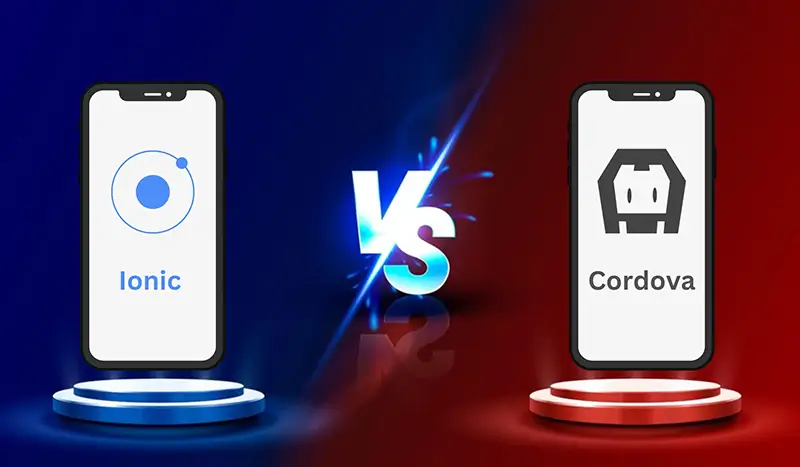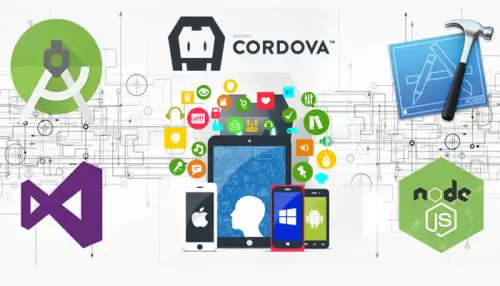When it comes to developing mobile applications, choosing the right framework is crucial to ensure the success and efficiency of your project. Two popular frameworks that often come into consideration are Ionic and Cordova. In this blog post, we will explore the key differences, advantages, and drawbacks of Ionic and Cordova to help you make an informed decision. So, let’s dive into the Ionic vs Cordova debate and see which framework reigns supreme.
Understanding Ionic and Cordova
Ionic and Cordova are both open-source frameworks used for hybrid mobile app development. They enable developers to create cross-platform applications using web technologies such as HTML, CSS, and JavaScript. However, there are significant differences between the two that can influence your choice based on your project requirements.
Ionic
Ionic is a framework built on top of AngularJS, which provides a comprehensive set of tools and UI components for creating hybrid mobile applications. It focuses on delivering native-like user experiences by utilizing web technologies. Ionic comes with a pre-designed UI kit and a powerful command-line interface (CLI) that simplifies development tasks. Furthermore, it offers a wide range of themes and plugins to enhance app functionality and appearance.
Cordova
Cordova, formerly known as PhoneGap, is a framework that acts as a bridge between web technologies and native device features. It allows developers to access native APIs using JavaScript, making it easier to build cross-platform mobile applications. Cordova utilizes a WebView component to render the application’s user interface, which provides a consistent experience across different platforms. It supports a vast array of plugins, enabling developers to access native features like camera, geolocation, and accelerometer.
Ionic vs Cordova: A Detailed Comparison
Performance
When it comes to performance, Cordova has a slight advantage over Ionic. Since Cordova uses a WebView component, it can sometimes suffer from performance issues, especially when dealing with complex animations or heavy computations. On the other hand, Ionic’s underlying Angular framework offers better performance optimizations, resulting in smoother app experiences.
User Interface
Ionic excels in terms of user interface design. It provides a wide range of pre-built UI components, including buttons, forms, navigation elements, and more. These components are designed to mimic native app elements, ensuring a seamless and intuitive user experience. Cordova, while offering some UI plugins, lacks the extensive UI library provided by Ionic.
Development Speed
Ionic’s CLI tools and extensive documentation make development faster and more efficient. It offers a rich set of pre-built components and ready-to-use templates, enabling developers to rapidly prototype and build applications. Cordova, while still relatively fast, requires additional effort in integrating plugins and customizing UI elements, which can slow down the development process.
Community and Ecosystem
Both Ionic and Cordova have large and active communities that contribute to their growth and offer support to developers. However, Ionic’s community is larger and more vibrant, resulting in a richer ecosystem of plugins, themes, and resources. The Ionic marketplace provides developers with an extensive collection of ready-made components and themes, significantly reducing development time.
Native Features and Plugins
Cordova has a wider range of plugins available, allowing developers to access more native device features and capabilities. These plugins cover various functionalities like accessing the camera, accelerometer, file system, and more. While Ionic also supports Cordova plugins, the number of Ionic-specific plugins is comparatively smaller.
Ionic vs Cordova vs Other Frameworks
It’s essential to consider other popular frameworks when comparing Ionic and Cordova. React Native and Flutter are two prominent competitors in the hybrid app development landscape.
Ionic vs Cordova vs React Native
React Native, developed by Facebook, is known for its high-performance and native-like user experiences. It uses a different approach, rendering native components instead of a WebView. React Native is ideal for large-scale applications that require complex functionality and superior performance. However, Ionic’s simplicity and ease of use make it a more suitable choice for small to medium-sized projects.
Ionic vs Cordova vs Flutter
Flutter, developed by Google, is another robust framework that utilizes a different approach to building cross-platform applications. It uses a single codebase to compile native apps, resulting in highly performant applications. Flutter is gaining popularity rapidly, but its steep learning curve and limited community support might make Cordova or Ionic more appealing for developers seeking a simpler and well-established ecosystem.
Leveraging OdiTek Solutions’ Expertise
When it comes to harnessing the power of Ionic and Cordova, OdiTek stands out as a reliable and experienced technology partner. With our expertise in hybrid app development, we can help you navigate the Ionic vs Cordova debate and deliver exceptional mobile applications tailored to your unique requirements.
Consulting and Planning
Oditek Solutions’ team of seasoned professionals will work closely with you to understand your project goals, target audience, and technical specifications. We will provide comprehensive consulting and planning services, helping you choose the most suitable framework (Ionic or Cordova) based on your project’s scope, scalability, and future expansion plans.
Architecture and Design
Designing a robust and scalable architecture is crucial for successful app development. Oditek Solutions’ experts will assist you in creating an efficient architecture that leverages the strengths of Ionic or Cordova, ensuring optimal performance and flexibility. We will also focus on delivering an engaging user interface that aligns with your brand identity and enhances user experience.
Development and Integration
Our skilled development team will bring your app vision to life by leveraging the extensive knowledge of Ionic and Cordova. We will implement best practices and coding standards, ensuring a clean and maintainable codebase. Additionally, we will seamlessly integrate the necessary plugins and APIs to leverage native device capabilities and enhance the app’s functionality.
Quality Assurance and Testing
Ensuring the quality and reliability of your app is crucial for user satisfaction. Our dedicated QA and testing team will conduct thorough testing across various devices and platforms to identify and rectify any potential issues. We follow industry-standard testing methodologies and leverage automation tools to streamline the testing process and deliver a robust and bug-free application.
Maintenance and Support
OdiTek provides comprehensive post-development support and maintenance services to ensure the long-term success of your application. From timely updates & bug fixes to security patches we provide it all to keep your app running smoothly and securely. Additionally, our support team is readily available to address any queries or concerns that may arise after the app’s deployment.
Conclusion
Choosing between Ionic vs Cordova for your mobile app development, requires careful consideration of project requirements, performance expectations, and community support. With OdiTek Solutions’ expertise in Ionic and Cordova, you can confidently make this decision and embark on a successful app development journey. Their comprehensive range of services, from consulting and planning to maintenance and support, ensures that you receive a top-notch solution tailored to your specific requirements. Leverage OdiTek Solutions’ expertise and make the right choice between Ionic and Cordova for your next mobile app project.







